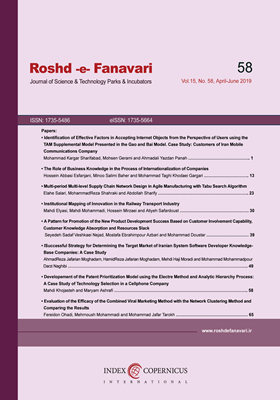The Role of Business Knowledge in the Process of Internationalization of Companies
Subject Areas : Knowledge Management
Hossein Abbasi-Esfanjani
1
![]() ,
Minoo Salimi
2
,
Mohammad taghei khodaei -gargarei
3
,
Minoo Salimi
2
,
Mohammad taghei khodaei -gargarei
3
1 -
2 -
3 - Tehran University
Keywords: Internationalization Business Knowledge Commercial Knowledge Knowledge Model Knowledge Components,
Abstract :
The main aim of this paper is to identify the knowledge elements that play a crucial role in the internationalization process of companies. Reviewing research literature shows, Companies that use the two-dimensional model for business knowledge divide knowledge into two dimensions: explicit or tacit nature, and the nature of the codified or uncodified. This model states that the tacit knowledge is difficult to transfer to others, while the explicit and uncodified knowledge component is the simplest form of knowledge for transferring to others. The statistical population of the study consist of managers and experts of the foreign trade sector (export and import) of companies that were present in international markets. For this purpose, 104 companies were selected from among five different types of business in East Azerbaijan province, and for data gathering, questionnaire was applied. Findings show that all variables of individual competency of employees, organizational beliefs and habits, and corporate procedures are related to the degree of internationalization. However, the strongest link between internationalization and various elements of business knowledge was identified in the field of organizational beliefs and habits, and individual competence of employees.
1- فقیهی، ابوالحسن؛ تاج الدین مهدي و تاج الدین مهران. بین المللی شدن کسب و کارهاي کوچک و متوسط در صنعت غذایی: ارائه یک مدل علّی. فصلنامه علوم مدیریت ایران، سال پنجم، شماره 17، بهار 1389، ص 22 – 1.
2- عباسی اسفنجانی، حسین و سلیمی باهر، مینو. بازرگانی بین¬الملل و صادرات. انتشارات تبریز، 1397، زیر چاپ.
3- ولی بحرینی، حسین و خیاط مقدم، سعید. شناسایی عوامل موثر بر نوآوري مبتنی بر دانش با روش دلفی. سومین کنفرانس بین¬المللی پژوهشهاي نوین در مدیریت- اقتصاد و حسابداري، استانبول، 1394.
4- سرمد، زهره؛ بازرگان، عباس و حجازی، الهه. روش های تحقیق در علوم رفتاری. چاپ یازدهم، انتشارات آگاه، 1384.
5- Davenport, T., & Grover, V. Knowledge Management. Journal of Management Information Systems, 18(1), 3-4, 2001.
6- Wickramasinghe, N. The Phenomenon of Duality: The Key to Facilitating the Transition form Knowledge Management to Wisdom for Inquiring Organizations. In Courtney et al. (Eds.), Inquiring organizations: Moving form Knowledge Management to Wisdom. Hershey, PA: Idea Group Publishing, 2005.
7- Naisbitt, J. Megatrends. Ten New Directions Transforming Our Lives. New York: Warner Books, 1982.
8- Polanyi, M. The Tacit Dimension. London: Routledge and Kegan, 1966.
9- Lundvall, Bengt-Åke; Rasmussen, Palle; Lorenz Edward. Education in the Learning Economy; a European perspective, Policy Futures in Education, Vol. 6, No. 6, 2008.
10- Sveiby, K. E. The New Organizational Wealth. San Francisco: Berrett-Koehler Publishers, 1997.
11- Starbuck, W. H. Learning by knowledge intensive firms. Journal of Management Studies, 29 (6), 713-740, 1992.
12- March, J. G., & Levitt, B. Organizational learning. Annual Review of Sociology, 14, 319-338, 1988.
13- Kuwada, K., & Asaba, S. The continuous side of discontinuity. Tokyo Metropolitan University - Journal of the Faculty of Economics, 63, 1989.
14- Bartha, Z. & Gubik, A.S. The Role of Business Knowledge in the Internationalisation Process of Hungarian Corporations (chapter 6), 2014.
15- Rowley, J. Partnering Paradigms? Knowledge management and relationship marketing. Industrial management & Data Systems,104, PP:149-157, 2004
16- Rasooli, P. Knowledge management in call centers. Master Thesis, Lulea University of Technology, 2006.
17- Naidu, G. M., Cavusgil, T., Kinnera, S., & Murthy, B. (1997). An export promotion model for India: Implications for public policy. International Business Review, 6(2), 113-125.
18- Johanson, J., & Wiedersheim-Paul, F. The Internationalization of the Firm. Four Swedish Cases. In: Buckley, P., & Ghauri, P.N. (eds.) (2006): The Internationalization of the Firm. New York: International Thomson Business Press, 2006.
19- Wach, K. Theoretical Framework of the Firm-Level Internationalisation in Business Studies (chapter 1), In: Duréndez, A., & Wach, K. (2014). Patterns of Business Internationalisation in Visegrad Countries – In Search for Regional Specifics. Cartagena: Politencina Universitad de Cartagena, pp. 13-30, 2014.
20- Johanson, J., & Vahlne, J.E. The Mechanism of Internationalisation. International Marketing Review, 7(4), 11-24, 1990.
21- Muhammad, A., Syed Zulfiqar, A. S., Sher, Z. K., "The role of personality in SMEs internationalization: empirical evidence", Review of International
Business and Strategy, Vol. 28 Issue: 2, pp.258-282, 2018, https://doi.org/10.1108/RIBS-12-2017-0113 22- Katerina, K., Emmanuella, P., Tanja, L., "Family business internationalization and networks: emerging pathways", Journal of Business & Industrial
Marketing, Vol. 32 Issue: 3, pp.357-370, 2017, https://doi.org/10.1108/JBIM-04-2015-0066 23- Reid, S.D. The Decision-Maker and Export Entry and Expansion. Journal of International Business Studies, 12, 101–112, 1981.
24- Cavusgil, S.T., & Knight, G. Born global firms – A new international enterprise. New York: Business Expert Press, LCC, 2009.
25- Johanson, J., & Mattsson, L.G. Interorganizational relations in industrial systems: a network approach compared with the transaction cost approach. International Studies of Management & Organization 17(1), 34, 1987.
26- Gubik, A.S. & Karajz, S. The Choice of Foreign Market Entry Modes – The Role of Resources and Industrial Driving Forces. Entrepreneurial Business and Economics Review, 2 (1), 2014.
27- Barkema, H., Bell, J.H., & Pennings, J.M. Foreign Entry, Cultural Barriers, and the experience factor in foreign market entry behavior of service firms. Learning. Strategic Management Journal, 17, 151-166, 1996.
28- Hitt, M.A., Bierman, L., Uhlenbruck, K., & Shimizu, K. The Importance of Resources in the Internationalization of Professional Service Firms: The Good, the Bad and the Ugly. The Academy of Management Journal 49(6), 1137-1157, 2006.


